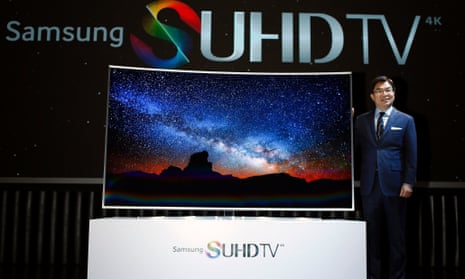The Sun was an unlikely advocate for privacy in its special investigation piece early this week on the snooping Samsung telly. Forget phone hacking, it’s the technology companies you need to watch out for. The Sun’s outrage was not confined to Samsung: a neighbouring article reminded us of recent privacy complaints against Facebook and Google.
The Orwell-inspired Samsung “smart” TV is certainly an eye-catching latest in a long line of privacy fails by the media and technology giants that we have grown to rely on.
We know our emails can be monitored and are stored in the US, likewise our internet history and iCloud-stored selfies (naked or otherwise). Thank goodness our telephone call-data is stored in the UK ... Now we hear that our too-smart new TV could be listening to our conversations and sending them to a Massachusetts-based sub-contractor. The smart TV could make all of us involuntary Goggle-box participants.
Samsung has told us that all is well and that the data is encrypted. Furthermore, it has attempted to clarify the policy that gave rise to the concerns. In a statement released on Wednesday, the firm reiterated that the data could be collected by Samsung and transmitted to a third-party voice recognition service but added: “Samsung will collect your interactive voice commands only when you make a specific search request to the Smart TV by clicking the activation button either on the remote control or on your screen and speaking into the microphone on the remote control.”
I hope that makes them feel better, but I am not sure I do.
The starting point for those of us in the UK not contracted to a reality TV show is that every conversation inside our own home is private. The thought that our spoken words in our own living room should not contain personal or sensitive information is laughable.
Article 8 of the European Convention on Human Rights provides us lucky Europeans (without a Samsung TV) protection of our private and family life, our home and our correspondence. The ability to speak freely in private is also protected by Article 10 on the right to freedom of expression. The Data Protection Act serves to ensure that our data is only processed fairly and for a specific purpose.
All these laudable legal rights are well and good but us technology-hungry time-poor consumers face practical obstacles. Firstly, our attention to the consents we provide when purchasing anything from apps to Apple computers is cursory at best. The law concerning consent is complex and arguably several steps behind the technology and consumer practice.
The Data Protection Directive defines consent as “any freely given, specific and informed indication of his wishes by which the data subject signifies his agreement to personal data relating to him being processed”. How can we provide this informed consent when we are used to instantaneous online purchases?
The second problem is that even if we are minded to challenge an alleged misuse of our data, we are likely to have to seek to bring proceedings against a company outside of the jurisdiction of the UK courts.
Dragging US companies to a UK Court is no mean feat. Having just experienced a major internet company’s application to resist the progress of a client’s case on the grounds of jurisdiction, I can testify that it is not for the faint hearted. The Information Commissioner may ride to your rescue, but if not, you had better have the money and the stomach for litigation.
The question is, do we really care if our data is being held on the hard drives of some bespectacled boffins of a US tech company? The Edward Snowden NSA revelations courtesy of the Guardian are probably sufficient forewarning for most of us that the data held by US tech companies is supremely vulnerable, particularly for non-Americans.
But the more prosaic British old-media scandals such as those investigated by Operation Weeting and Operation Motorman at their core involved the misuse of personal data. They neatly demonstrate the risks of personal data being stored and left vulnerable for exploitation by a canny investigator wanting to turn a buck.
Perhaps more inevitable is that our data will be used by software designed to target advertising. Voice and other data linked to your TV use, like web-browsing data, could provide a valuable tool for the type of bespoke advertising we have become used to on the internet, and will surely become a feature of TV advertising. Do we want our TV advertising influenced by our family’s private conversations and responses?
The truth is that the law moves too slowly, while the technology arms race moves too fast. Our privacy is the casualty and my view is that the increasing encroachment of technology into our personal lives will have a significant and detrimental impact on human behaviour. Apart from the potential benefit to those with disabilities, do we really need voice-activated TVs? Sacrificing the fundamental human right to privacy strikes me as quite a price to pay.
Dominic Crossley is a partner and specialist in Privacy & Media Law in the London firm Payne Hicks Beach
To get weekly news analysis, job alerts and event notifications direct to your inbox, sign up free for Media Network membership.
All Guardian Media Network content is editorially independent except for pieces labelled “Brought to you by” – find out more here.
